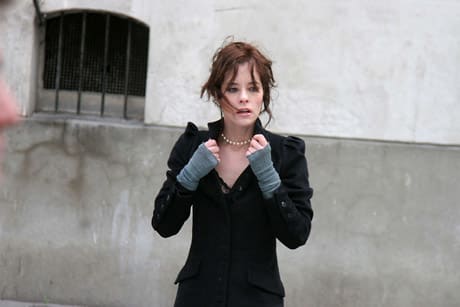Hal Hartley’s decade-later follow-up to Henry Fool has none of that film’s wit or power. And although it grasps at bigger issues than were covered in the original, it somehow seems like less of a statement.
Parker Posey stars as the eponymous Ms. Grim, who hasn’t seen her fugitive ne’er-do-well husband Henry Fool (Thomas Jay Ryan) since he split the country under the name of her poet brother Simon (James Urbaniak). Suddenly, she’s approached by CIA agent Fulbright (Jeff Goldblum) to retrieve the notebooks containing Henry’s famously terrible manuscript of “confessions.” Those confessions are revealed to have been written in code and Henry to be an ex-operative who’s been bouncing around various international hotspots, but not before Fay has gotten in over her head with assorted spooks, assassins, fugitives and the occasional Mujahedin.
On the surface, everything is solid: Hartley’s mise-en-scène is immaculate and the actors (especially Urbaniak) acquit themselves more than admirably. But the film somehow lacks the life and punch needed to grab hold of your sensibilities. Not only does it essentially negate the artistic mentor drama of its predecessor, but its plot mechanics slow down whatever other motives it has — the mystery and the melancholy of prime Hartley are obscured by a sort of DaVinci Code writ that’s small and has grown tired. And while the film’s geopolitical sense is remarkably nuanced (especially when compared to something like Munich), the characters and situations lack the commensurate complexity to make the gesture count.
Though it’s still a Hartley picture (and thus more interesting in its failure than 65 percent of other movies), I’d be lying if I said this was must-see cinema even for the director’s fans.
(Alliance Atlantis)Parker Posey stars as the eponymous Ms. Grim, who hasn’t seen her fugitive ne’er-do-well husband Henry Fool (Thomas Jay Ryan) since he split the country under the name of her poet brother Simon (James Urbaniak). Suddenly, she’s approached by CIA agent Fulbright (Jeff Goldblum) to retrieve the notebooks containing Henry’s famously terrible manuscript of “confessions.” Those confessions are revealed to have been written in code and Henry to be an ex-operative who’s been bouncing around various international hotspots, but not before Fay has gotten in over her head with assorted spooks, assassins, fugitives and the occasional Mujahedin.
On the surface, everything is solid: Hartley’s mise-en-scène is immaculate and the actors (especially Urbaniak) acquit themselves more than admirably. But the film somehow lacks the life and punch needed to grab hold of your sensibilities. Not only does it essentially negate the artistic mentor drama of its predecessor, but its plot mechanics slow down whatever other motives it has — the mystery and the melancholy of prime Hartley are obscured by a sort of DaVinci Code writ that’s small and has grown tired. And while the film’s geopolitical sense is remarkably nuanced (especially when compared to something like Munich), the characters and situations lack the commensurate complexity to make the gesture count.
Though it’s still a Hartley picture (and thus more interesting in its failure than 65 percent of other movies), I’d be lying if I said this was must-see cinema even for the director’s fans.
